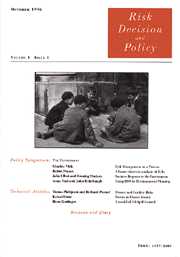Article contents
Optimal pollution control under imprecise environmental risk and irreversibility
Published online by Cambridge University Press: 01 June 2000
Abstract
This paper deals with a model of pollution accumulation in which a catastrophic environmental event occurs once the pollution stock exceeds some uncertain critical level. This problem is studied in a context of ‘hard uncertainty’ since we consider that the available knowledge concerning the value taken by the critical pollution threshold contains both randomness and imprecision. Such a general form of knowledge is modelled as a (closed) random interval. This approach is mathematically tractable and amenable to numerical simulations. In this framework we investigate the effect of hard uncertainty on the optimal pollution/consumption trade-off and we compare the results with those obtained both in the certainty case and in the case of ‘soft uncertainty’ (where only randomness prevails).
- Type
- Technical article
- Information
- Copyright
- © Risk, Decision and Policy, 2000
- 9
- Cited by


